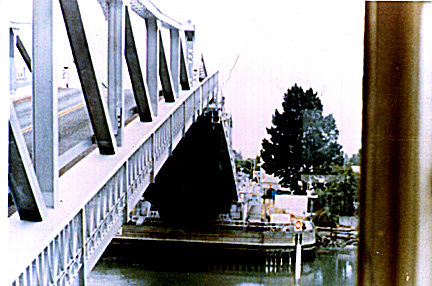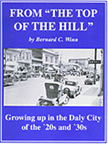INCLINE PRESS
2 Townsend St., 2-213
San Francisco, CA 94107
(415) 284-0127
|

|

|
|
|
SAN FRANCISCO PHOTOS
|

|

|
|
|

|
|
|

|
|
|

|
|
|

|
|
|

|
|
|

|
|
|

|
|
|

|
|
|

|
|
|
BOOKS
|

|

|
|
|

|
|
|

|
|
|

|
|
|

|
|
|

|
|
|

|
|
|

|
|
|

|
|
|

|
|
|

|
|
|

|
|
|

|
|
|
NON-SAN FRANCISCO PHOTOS
|

|

|
|
|

|
|
|

|
|
|

|
|
|

|
|
|
OTHER STUFF
|

|

|
|
|
|

|

INCLINE PRESS: The Alameda Connection #3
|

|
|

|

|


OAKLAND <<——>>ALAMEDA
DRAWBRIDGES
In January of 1972, the federal government removed the ancient Fruitvale bridge and began construction on a new one.

Above is the Miller Sweeney Bridge which, in 1973, replaced the old and troublesome Fruitvale swing bridge. The $4,000,000 single-leaf bascule bridge is the newest drawbridge on the Oakland Estuary.
In the background is the Southern Pacific Railroad bridge.

This closeup of the S.P. Bridge shows it in the closed
position. Since far more traffic passes under the bridge
than over it, it's normal position would be in the open
position. It only closes when a train needs to cross.
This vertical lift bridge was completed in 1951 by the
U.S.Corps of Engineers to get the railroad tracks off the
Fruitvale Bridge.

The 1970 photo above shows the Fruitvale swing bridge framed by the S.P. lift bridge. The view is south from the direction of Park Street. This is the normal position of the railroad bridge, which in the case of a vertical lift span, is open.

The original Park Street Bridge above was the first of three swing bridges built by the government around the turn of the 19th century. The other bridges were the High Street and Fruitvale Avenue swing bridges. Opened to road traffic in 1892, it was ten years before the channel under it was navigable by anything much larger than a row boat. In place until 1934, it was removed to make way for the existing structure.
Built of wrought iron with a wooden roadway and approach spans, it carried one set of streetcar tracks down the center. Horses, autos and pedestrians also used the bridge. Alameda Library photo

The existing Park Street Bridge, completed in 1935, is also unique. It was the first bascule bridge to span the estuary. In fact, all three of the government built bridges were replaced by bascule spans in the same order as the old ones were completed; the Park, High and then the Fruitvale.
This double-leaf bascule bridge has four traffic lanes and can be opened and closed quickly to allow vessels to pass through.
A high point of its "Grand Opening" celebration was the wedding of an Oakland man and an Alameda woman in the center of the span.
The above photo was taken in 1970.

Another view of the Park Street Bridge c1970.

The Old High Street Bridge c1930.
Like the Park and Fruitvale bridges, it too had little or no water under it for close to ten years after being completed in 1901.
Second only to the Fruitvale bridge in the matter of problems, it seemed to have been hit by nearly everything that passed through its draw. It was nearly destroyed by fire just months after being dedicated and condemmed and closed for several months in 1927. Oakland Library photo.

The existing High Street Bridge, shown above, was dedicated in 1939 and although it looks very much like the Park Street span, it carries only two traffic lanes, compared to the park's four. For many years that was a bone of contention, especially since the Park Street span had cost only slightly more to build. As time passed and the old Fruitvale Bridge gave way to the present one, most people agreed that life with the bridges was much better than before.

Shown in the partly open position, the completion of the High Street Bridge above, greatly improved the flow of traffic on the estuary and it is still an active and important part of everyday life for Alamedans.

Bay Farm Island bridges

|

|
|












